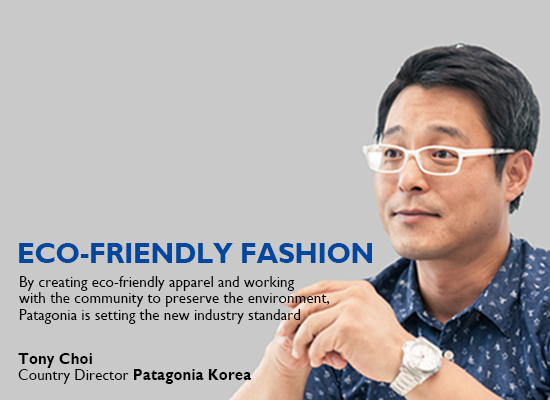Feature Stories
- Home
- Why KOREA
- Feature Stories

By creating eco-friendly apparel and working with the community to preserve the environment, Patagonia is setting the new industry standard
When it comes to being fashion-forward, outdoor clothing brands usually don’t come to mind. For many years, outdoor performance apparel has been associated with being durable but bulky, sacrificing fashion for functionality. But Patagonia is breaking down these stereotypes. Founded in 1973 in California by rock climber Yvon Chouinard, this American-based apparel brand caters to both traditional and trendy outdoor adventurers. And if there’s one country that knows anything about trends, it’s Korea. So it comes as no surprise when the company opened up its Korea branch in July of 2016.
With Koreans becoming more health conscious, “well-being” products and exercise apparel are always in high demand. Although Korea’s overall fashion market has fluctuated in recent years, the outdoor clothing industry has shown relatively steady growth. Thanks to such demand, the country boasts the second largest outdoor goods market in the world despite its diminutive size.
“Korean consumers are very interested in outdoor culture,” says Tony Choi, Country Director of Patagonia Korea. “Awareness of environmental issues is also growing. Patagonia’s philosophy of creating environmentally-friendly and durable products combined with Korea’s interest in outdoor activities meshed together really well.”
In a nutshell, Patagonia’s vision is to make high-quality apparel without harming the environment. Most notably, it transforms used plastic water bottles into polyester fabrics and uses organic cotton which hasn’t been sprayed with pesticide or chemicals. The company also works closely with the local community, including grassroots groups to protect the environment. Last year, the company launched the ‘Worn Wear’ campaign, fixing worn out shoes and frayed clothes for customers to minimize the effect that unnecessary spending has on the environment.
But it’s not just nature that Patagonia is passionate about. The company knows well that Korean consumers are heavily driven by trends. To meet the ever-changing demands, Patagonia released an exclusive live of limited edition products from its ‘Pataloha’ (a combination of Patagonia and aloha) collection targeting the Korean market. Due to its deft eye for style, Patagonia recorded a 15 percent growth in just the first quarter of this year. On average, each of the 31 stores in Korea saw sales rise by 20 percent. Following an intricate step-by-step strategy, Patagonia has opens three to five stores every year. In 2017, the company plans to expand the total number of stores to 35.
Another reason for Patagonia’s success in Korea is the appeal it has to consumers from all walks of life. Choi says that most Korean consumers would buy outdoor products related to light activities like hiking. The trend is changing, as Koreans are showing a growing interest in more extreme sports, like mountain biking, climbing and surfing. And to meet such changing demand, Patagonia has expanded its product line to include swimwear, skiwear, sundresses and underwear. From socks and sweatshirts to wetsuits and waders, it’s clear that Patagonia Korea is redefining the outdoor apparel industry.
Just like any company entering uncharted territory, there were a number of obstacles facing Patagonia when it initially came to the Korean market. “Korea’s outdoor product market was stagnant when we first tried to enter. And as a new brand in Korea, operating a stable business was a bit of a challenge. But despite all these factors, Patagonia has become the only outdoor apparel brand that has shown positive growth,” says Choi. “Just like there are so many different cultures, there are also many different markets. To be a successful company, you need to implement a flexible business strategy that takes into consideration such diversity.”
Although an internationally recognized brand with a global network, Patagonia’s Korea office works closely with local businesses to promote its fashionable and functional apparel. With the exception of manufacturing, all other aspects of business operation and management are conducted with domestic companies. Choi emphasizes that Patagonia actively plans on establishing long-term partnerships with them to help Korea’s economy grow. When asked about the company’s vision beyond Korea, he says Patagonia has directly entered the Japanese and Australian market. It is also actively doing business in other Asian countries like China, Hong Kong and Taiwan. Considering that Asia makes up a significant portion of the global market, it plans on actively engaging and investing in the Asia region. And with its unwavering passion for creating green fashion, Patagonia Korea is sure to help the rest of the fashion industry clean up its act.
By Esther Oh (estheroh@kotra.or.kr)
Executive Consultant/Invest Korea










